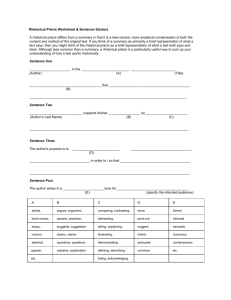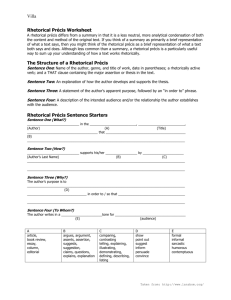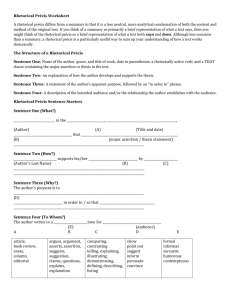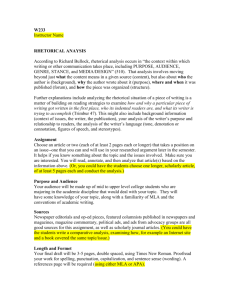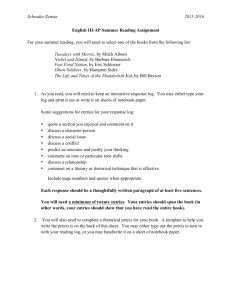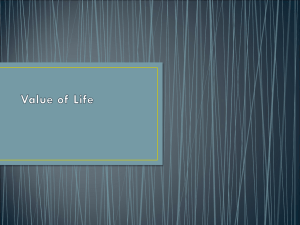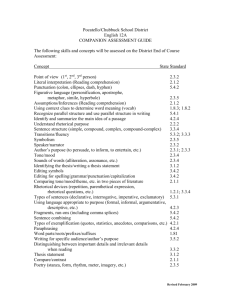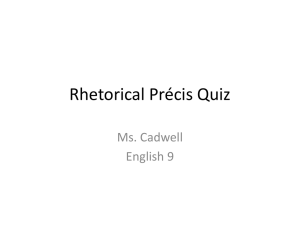1. Read Mountains Beyond Mountains by Tracey Kidder 1. Read
advertisement
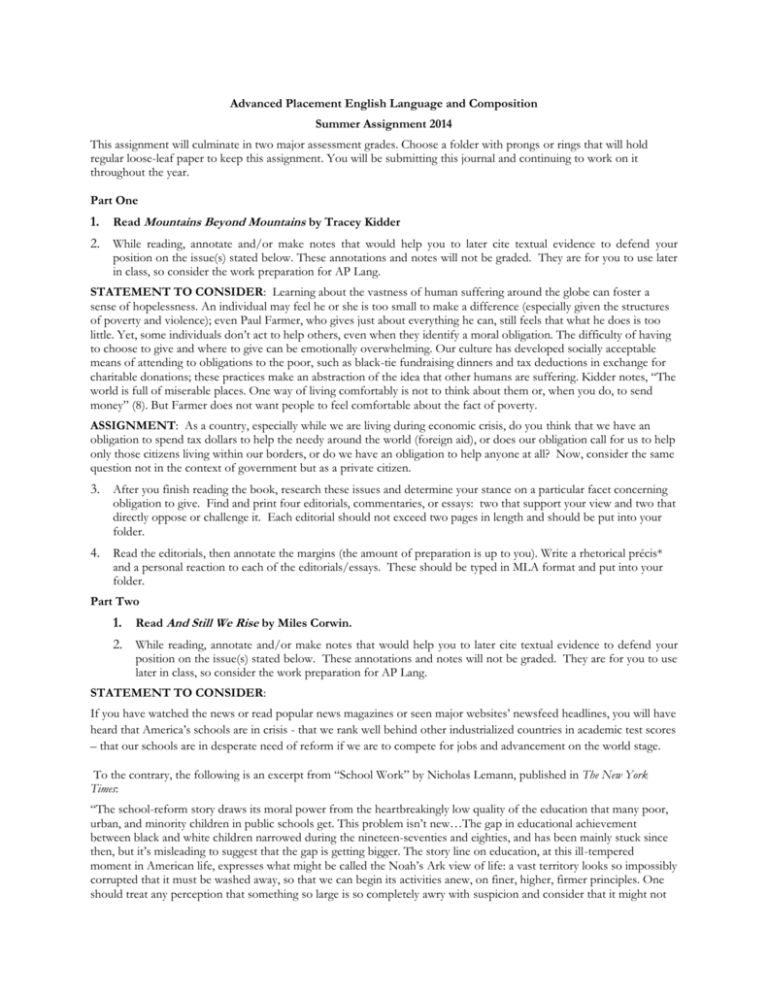
Advanced Placement English Language and Composition Summer Assignment 2014 This assignment will culminate in two major assessment grades. Choose a folder with prongs or rings that will hold regular loose-leaf paper to keep this assignment. You will be submitting this journal and continuing to work on it throughout the year. Part One 1. Read Mountains Beyond Mountains by Tracey Kidder 2. While reading, annotate and/or make notes that would help you to later cite textual evidence to defend your position on the issue(s) stated below. These annotations and notes will not be graded. They are for you to use later in class, so consider the work preparation for AP Lang. STATEMENT TO CONSIDER: Learning about the vastness of human suffering around the globe can foster a sense of hopelessness. An individual may feel he or she is too small to make a difference (especially given the structures of poverty and violence); even Paul Farmer, who gives just about everything he can, still feels that what he does is too little. Yet, some individuals don’t act to help others, even when they identify a moral obligation. The difficulty of having to choose to give and where to give can be emotionally overwhelming. Our culture has developed socially acceptable means of attending to obligations to the poor, such as black-tie fundraising dinners and tax deductions in exchange for charitable donations; these practices make an abstraction of the idea that other humans are suffering. Kidder notes, “The world is full of miserable places. One way of living comfortably is not to think about them or, when you do, to send money” (8). But Farmer does not want people to feel comfortable about the fact of poverty. ASSIGNMENT: As a country, especially while we are living during economic crisis, do you think that we have an obligation to spend tax dollars to help the needy around the world (foreign aid), or does our obligation call for us to help only those citizens living within our borders, or do we have an obligation to help anyone at all? Now, consider the same question not in the context of government but as a private citizen. 3. After you finish reading the book, research these issues and determine your stance on a particular facet concerning obligation to give. Find and print four editorials, commentaries, or essays: two that support your view and two that directly oppose or challenge it. Each editorial should not exceed two pages in length and should be put into your folder. 4. Read the editorials, then annotate the margins (the amount of preparation is up to you). Write a rhetorical précis* and a personal reaction to each of the editorials/essays. These should be typed in MLA format and put into your folder. Part Two 1. Read And Still We Rise by Miles Corwin. 2. While reading, annotate and/or make notes that would help you to later cite textual evidence to defend your position on the issue(s) stated below. These annotations and notes will not be graded. They are for you to use later in class, so consider the work preparation for AP Lang. STATEMENT TO CONSIDER: If you have watched the news or read popular news magazines or seen major websites’ newsfeed headlines, you will have heard that America’s schools are in crisis - that we rank well behind other industrialized countries in academic test scores – that our schools are in desperate need of reform if we are to compete for jobs and advancement on the world stage. To the contrary, the following is an excerpt from “School Work” by Nicholas Lemann, published in The New York Times: “The school-reform story draws its moral power from the heartbreakingly low quality of the education that many poor, urban, and minority children in public schools get. This problem isn’t new…The gap in educational achievement between black and white children narrowed during the nineteen-seventies and eighties, and has been mainly stuck since then, but it’s misleading to suggest that the gap is getting bigger. The story line on education, at this ill-tempered moment in American life, expresses what might be called the Noah’s Ark view of life: a vast territory looks so impossibly corrupted that it must be washed away, so that we can begin its activities anew, on finer, higher, firmer principles. One should treat any perception that something so large is so completely awry with suspicion and consider that it might not be true—especially before acting on it.” ASSIGNMENT: Is the idea of "America's failing schools" a justifiable crisis as test scores and drop-out rates suggest, or is it just a popular cultural narrative bolstered by statistics and human entities (such as teachers' unions)? Then, determine your assessment of “America’s failing schools” as fiction or non-fiction, then determine who is primarily responsible for this story? Government? American Education Model? Teachers? Parents? Communities? Media? Students? 5. After you finish reading the book, research these issues and determine your stance. Select and print four editorials, commentaries, or essays: two that support your view and two that directly oppose or challenge it. Each editorial should not exceed two pages in length and should be put into your folder. 6. Read the editorials then annotate the margins (the amount of preparation is up to you). Write a rhetorical précis* and a personal reaction to each of the editorials/essays. These should be typed in MLA format and put into your folder. Part Three Compile a bibliography of all the sources you consulted during your research on these two issues. Type and print it using MLA formatting, and include it in your folder. Part Four Purchase / Acquire The Lively Art of Writing by Lucile Vaughan Payne. You will need this book the 2nd week of class. *Directions for writing a rhetorical précis are attached. Directions for the Rhetorical Précis The précis is a highly structured four-sentence paragraph that records the essential elements of a unit of spoken or written discourse, including the name of the speaker/writer, the context of the delivery, the major assertion, the mode of development and/or support, the stated and/or apparent purpose, and the relationship established between the speaker/writer and the audience (the last element is intended to identify the tone of the work). Each of the four sentences requires specific information; you are also encouraged to integrate brief quotations to convey the author’s sense of style and tone. Format is as follows: 1. Name of author [optional: a phrase describing author], genre and title of work [date and additional publishing information in parenthesis]; a rhetorically accurate verb (such as "assert," "argue," “suggest," "imply," "claim," etc.); and a THAT clause containing the major assertion (thesis statement) of the work. 2. An explanation of how the author develops and/or supports the thesis, usually in chronological order – always identifying the rhetorical modes and strategies employed. 3. A statement of the author's apparent purpose followed (introduce with the infinitive “to”). 4. A description of the intended audience and the relationship the author establishes with it. Further Details and Explanation of Purpose: The first sentence is probably the most difficult. Be careful to employ a rhetorically accurate verb followed by a THAT clause, avoiding the use of more general words such as "writes" and "states." The THAT clause is designed to demand a complete statement: a grammatical subject (the topic of the essay) and predicate (the claim that is made about that topic). If the THAT clause is not employed, you will end up allowing "about" and "how" to slip out in stating the thesis: i.e., "Sheridan Baker writes about attitudes in writing" or "... states how attitudes affect writing" -- neither of which reports what he claims to be true about attitudes. The second sentence is less structured. Sometimes it works best to report the order of development: "The author develops this assertion by applying these techniques to two poems, by providing definitions, and by explaining the history of each approach." A more general statement may also work in the second sentence: "The author develops this idea by comparing and contrasting the lives of these two Civil War heroes." The third sentence sometimes inadvertently restates the thesis: "The author's purpose is to prove that..." Remember that one’s purpose is always to put forward a thesis, but there are others as well. The infinitive “to" phrase should transcend a phrase such as “Her purpose is to inform;" look beyond such a simplistic response to assess what the author wants the audience to do or to feel as a result of reading the work. In the fourth sentence, you need to answer how the language of the work excludes certain audiences (non-specialists would not understand the terminology; children would not understand the irony) in order to see that the author did make certain assumptions about the pre-existing knowledge of the audience. This sentence may also report the author's tone. Student Produced Example: In her essay “Women Who Write too Much” from Remembered Rapture (1999), Bell Hooks suggests that all dissident writers, particularly black female writers, face enormous time pressures: if they are not prodigious, they are never noticed by mainstream publishers. She supports her position first by describing her early writing experiences that taught her to “not be afraid of the writing process”; second, by explaining her motives for writing, including “political activism”; and lastly, by affirming her argument, stressing that people must strategically schedule their writing and “make much of that time.” Her two-pronged purpose is to respond to critics and to encourage minority writers to develop their own voice. Although at times her writing seems almost didactic, Hooks ultimately establishes a companionable relationship with her audience of both critics and women who seek to improve the effectiveness of their own writing. For any questions, you may contact: wattsd@fultonschools.org morrism1@fultonschools.org
